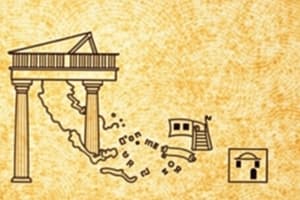Podcast
Questions and Answers
What was the primary function of the acropolis in a polis?
What was the primary function of the acropolis in a polis?
- A marketplace for trade and commerce
- A residential area for wealthy citizens
- A military training ground for soldiers
- A central location for assemblies and discussions (correct)
Which group within a polis had both legal and political rights?
Which group within a polis had both legal and political rights?
- Women and children
- Citizens from other city-states
- Men (correct)
- Slaves
How did citizenship affect the political rights of individuals from different city-states?
How did citizenship affect the political rights of individuals from different city-states?
- Citizens from other city-states had equal political rights
- Only citizens of the same polis had full political rights (correct)
- Citizens from other city-states had more political rights
- All citizens had the same legal rights regardless of citizenship
What rights did women and children possess within a polis?
What rights did women and children possess within a polis?
Which of the following statements about slaves in a polis is accurate?
Which of the following statements about slaves in a polis is accurate?
Flashcards
Polis
Polis
A city-state in ancient Greece, encompassing cities, towns, and smaller communities.
Acropolis
Acropolis
A fortified hilltop that served as a central location for assemblies, political discussions, and religious ceremonies within a polis.
Legal Rights in a Polis
Legal Rights in a Polis
The rights granted to individuals within a polis, such as ownership of property, participation in trade, and living peacefully.
Political Rights in a Polis
Political Rights in a Polis
Signup and view all the flashcards
Slaves in a Polis
Slaves in a Polis
Signup and view all the flashcards
Study Notes
City-States in Greece
- City-states (polis) in ancient Greece were made up of cities, towns, and smaller communities
- A central area called the acropolis was a hub for politics and religion
- A marketplace or public space was another important area, where people would gather
- Citizens had legal rights, such as freedom of trade, owning property, and living peacefully
- Political rights included voting and holding public office
- Men were considered the highest class and had both legal and political rights
- Women and children had legal rights but not political rights; these were typically controlled by the head of household
- Those living in other city-states may have only legal rights
- Enslaved people had no political or legal rights
Studying That Suits You
Use AI to generate personalized quizzes and flashcards to suit your learning preferences.




